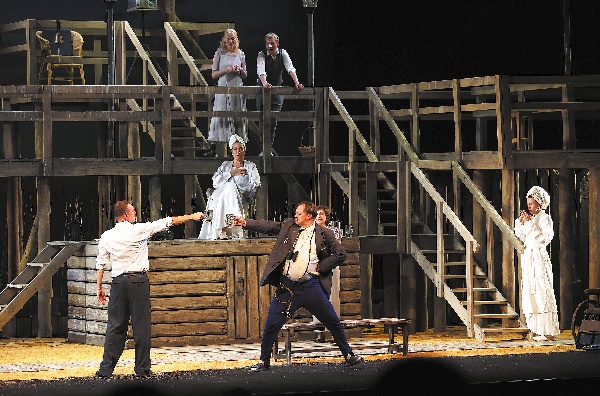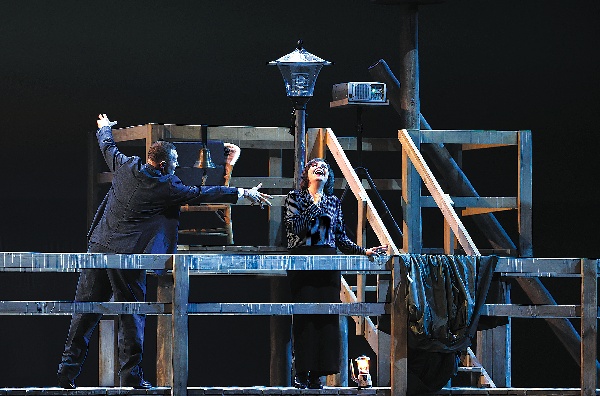On tour across China, director brings contemporary version of acclaimed stage story to tug at the hearts of theatergoers, Chen Nan reports.

Konstantin Khabenskiy’s direction of The Seagull is nothing short of transformative. Touring China as part of the prestigious Moscow Art Theatre’s international program, this production breathes new life into Anton Chekhov’s classic while also reflecting the timelessness of its themes.
On Aug 8, Khabenskiy, who is also the artistic director of the Moscow Art Theatre, presented his rendition of The Seagull to an audience in Beijing. While the play’s universal themes of love and existential despair resonate with every generation, Khabenskiy’s production adds a layer of emotional abstraction and psychological depth, allowing The Seagull to transcend time and space. His sensitive direction and ability to capture Chekhov’s essential truths have turned this touring production into a cross-cultural experience — one that speaks directly to the hearts of Beijing theatergoers.
The China tour of The Seagull by the Moscow Art Theatre kicked off with performances in the capital on Aug 8-10. The tour will continue with shows in Shanghai from Aug 15 to 17 and Xiamen, Fujian province, from Aug 22 to 24.
“Chekhov’s works have found a strong following among Chinese audiences, thanks to skilled translators who have introduced his literary style to the Chinese-speaking world,” says Zhang Zhaohui, CPC Committee Member and deputy general manager of Beijing Poly Theatre Management Co, which is collaborating with the Russian theater’s China tour.
Zhang also notes that the tour coincides with the 165th anniversary of the birth of the renowned Russian writer and dramatist.
ALSO READ: From ancient tragedy to contemporary passion: a one-woman odyssey
Written in 1896, Chekhov’s world-famous play The Seagull has maintained its popularity not only in Russia but among directors worldwide. The play dramatizes the romantic conflicts of four main characters — Irina Arkadina, a fading middleaged actress; her lover, Boris Trigorin, a successful fiction writer; Irina’s son, Konstantin Treplev, a young and ambitious playwright; and Nina Zarechnaya, an aspiring young actress with whom the son is in love.
One of the most notable stage adaptations in China was produced by the Beijing People’s Art Theatre in 1991, with translation by Chinese scholar Tong Daoming. The production featured a venerable cast of veteran Chinese actors, including Pu Cunxin, Xu Fan and Yang Lixin, and was directed by Oleg Efremov, then the artistic director of the Moscow Art Theatre.
According to Khabenskiy, who became the artistic director of the Moscow Art Theatre in 2021, the birth of the theater is intrinsically tied to Chekhov’s drama. The Moscow Art Theatre, founded in 1898 by Konstantin Stanislavsky and Vladimir Nemirovich-Danchenko, was pivotal in bringing Chekhov’s works to life with a new approach to acting and directing. It was this theater company, renowned for its innovation in realism that famously staged Chekhov’s plays including The Seagull, with a focus on naturalistic performances and psychological depth.
In 1898, Stanislavsky directed the first major production of The Seagull at the Moscow Art Theatre. The production was groundbreaking because it marked a departure from traditional theatrical performances. Before this, Russian theater often relied on exaggerated gestures, melodramatic performances, and artificial settings. Stanislavsky’s production emphasized the internal emotions of the characters and the subtleties of their interactions. This approach was revolutionary and would become the foundation for Stanislavsky’s methods of acting, which later influenced directors and actors worldwide, including Chinese artists.

Over time, the Moscow Art Theatre became synonymous with Chekhov’s works. It was this theater that took Chekhov’s plays beyond Russia, spreading them internationally and cementing them as integral parts of the world theater. The Seagull, in particular, was staged and restaged many times, always offering new interpretations while maintaining its core message: the complexity of human relationships and the frustrations of personal and artistic aspirations, says Khabenskiy.
Khabenskiy, also an acclaimed actor and director, brings fresh energy to Chekhov’s classic, maintaining focus on psychological depth while ensuring that the play resonates with contemporary audiences. His direction maintains the original naturalism of the Moscow Art Theatre’s early productions, while also incorporating modern sensibilities and emotional intensity.
“In this version, we want to strike a chord with today’s audience, particularly youth’s selfishness and obsession. We highlight the characters’ urgent, almost reckless desire to be heard — a craving for love and recognition that cannot wait,” he says.
This “modern anxiety”, as Khabenskiy calls it, reflects a “fear of delayed gratification”, a pressure to fulfill desires immediately, “to love and be loved without waiting for tomorrow”. The director draws a parallel with the modern world, where communication is often fragmented.
“Despite being in conversation, people seem unable to truly listen to or see each other. This disconnection is deeply embedded in the characters’ struggles in this interpretation of the play,” he notes.
Khabenskiy also shifts the lens of Chekhov’s work, emphasizing that the true protagonists of this version of The Seagull are the female characters. According to Khabenskiy, it is the women’s love, attention, and obsessive desire that shape the men in their lives, which drives the tragedy.
“Their efforts propel the ambitions of others but ultimately lead to painful falls from grace. These women, often ignored or hurt, are not merely passive victims; they are catalysts for the characters’ fates,” he says.

This is the sixth production of The Seagull by the Moscow Art Theatre, which premiered in December 2024.
Another distinctive choice in Khabenskiy’s production is its “deviation from the traditional ending”, he says. In this version, Khabenskiy introduces a new, imagined fifth act that extends Chekhov’s world. This brief but poignant monologue follows the departure of the characters, leaving what comes next up to the imagination. After the pain and sorrow have settled, Khabenskiy envisions how life continues after the tragedy. This small addition serves as a bridge to Chekhov’s final work, The Cherry Orchard, offering a glimpse into the broader cycle of life and change.
For the actors, performing any role in the production is an immense privilege, “as artists and human beings”, says actor Igor Vernik, who portrays doctor Evgenii Dorn in this version. Vernik previously played the role of Trigorin, the writer, in previous production.
READ MORE: From Russia, with love
He describes the characters in the play as seeking refuge in each other, yet despite their desires, they remain like parallel lines — always close yet never truly converging, trapped in eternal uncertainty and existential doubt.
Vernik’s Dorn is not the typical detached, melancholic figure often seen in traditional portrayals. Instead, he is a risk-taker, someone who embraces life’s unpredictable nature and never retreats from its challenges.
“I find this portrayal deeply exciting, as it reimagines the role in a way never seen before onstage.Every role, every nuance, and every thematic element of this version offers a new interpretation, pushing the boundaries of Chekhov’s original vision,” he says.

“When I was younger and read Chekhov’s works, I felt that these stories had nothing to do with me. They were dull and boring. After all, during our teenage years, we tend to think that real life should be more intense and dramatic than what we see onstage,” says actress Kristina Babushkina, who plays the role of Irina Arkadina.
“As I’ve got older and revisited Chekhov’s work, I realized how deeply I connect with it now. You start noticing the subtleties that you never paid attention to before. They hit you right in the soul,” she says. “You find yourself rereading and watching adaptations of his plays and films. Suddenly, you feel a sharp sting. Those words strike you with precision. That’s when you realize the true tragedy of life, which Chekhov captured perfectly.
“I understand my role. But can I justify her actions? That might be a bit too much to ask. Still, as our teacher always says, an actor must defend their character no matter how terrible their actions are, no matter how difficult they are to understand,” Babushkina adds. “The character I play sees herself as ordinary, but she’s a soul that can never truly be ordinary. She longs endlessly for love, but at the same time, she is trapped in the abyss of her own misfortune. I believe this story transcends generations and time. It resonates universally.”
Contact the writer at chennan@chinadaily.com.cn


